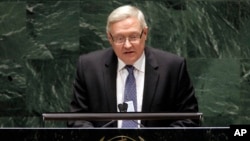With relations between the United States and Russia continuing to worsen, a leading Russian independent pollster and sociologist says the atmosphere of “militaristic euphoria” and anti-Americanism promoted by Russian authorities is inextricably linked with an ongoing crackdown on opponents of President Vladimir Putin.
This week, Russia threatened retaliation if the United States imposes fresh sanctions against it.
“If the United States, contrary to common sense and experience, and harmful to itself, moves toward a further expansion of sanction measures, I assure you that quite painful steps in response will be found in our arsenal,” Deputy Foreign Minister Sergei Ryabkov was quoted as saying.
Rybakov’s threat followed criticism of Russia by top U.S. and European officials.
Pollster sees trend
Meanwhile, the Levada Center, Russia’s only independent national polling agency, released survey results Wednesday showing that Russians continue to have a largely negative view of the United States, the European Union and Ukraine.
In an interview with VOA’s Russian service, the Levada Center’s director, Lev Gudkov, discussed the ongoing wave of anti-Americanism and militarism in Russia and the corresponding crackdown on Kremlin opponents.
Q: One gets the impression from recent statements by Russian politicians and diplomats that there has been a fresh surge in anti-Americanism. What does the polling data show?
A: The level of anti-American sentiment is really very high, although over the past year-and-a-half it has actually slightly decreased. Anti-Americanism hit a peak in January 2015. At that time, 81 percent (of poll respondents) expressed a negative attitude toward the United States, while it is now 64 percent, and has been approximately at that level for about a year. Thus, the intensity of the propaganda has reduced slightly, but it remains steady at a high level. Thus, one can talk about the systematic imposition of anti-American views (on Russians).
Q: But why does the Kremlin need this? What goals is it trying to achieve?
A: Two things are behind it: discrediting the values of rule of law, freedom and human rights, which are associated with the West and the United States; and, in applying that, discrediting all those groups and political forces that want change and reform in Russia and have criticized Putin’s authoritarian regime.
So they are indiscriminately designated as foreign agents, fifth columnists, national traitors. … The official propaganda is directed not so much against America as against various kinds of critics of the regime. That is why it is so shrill and constant.
Third World War
Q: Many experts say a militaristic mood is on the rise in Russia and that sentiments for a possible armed conflict are being stoked. Is that true?
A: That’s right. The population is living in an atmosphere like on the eve of a big war. It is not just a confrontation or information warfare, but, as our (poll) respondents sometimes say, the beginning of a third world war, although still in the cold phase. Therefore, it is extremely important that the confrontation with the West be presented in propaganda as (the West’s) opposition to a resurgent, growing Russia. In fact, at the heart of all of this lies an inferiority complex associated with the collapse of the Soviet Union, around which this whole militaristic upsurge and bellicose rhetoric are wrapped. It is a kind of game of war. Moreover, it is not associated with any real actions of the West. It is the narcotic effect of propaganda.
Q: The Russian leadership has consistently said that it does not want the country to be isolated, but its actions in Ukraine and Syria work strongly in the opposite direction. What explains this?
A: This demagogy on the part of the Kremlin is extremely typical. People partly understand (that it is demagogic). But they like a demonstration of brazen power. … Two-thirds of the population lives where they were born, without having gone anywhere else. For them, the threat of isolation from the rest of the world is unreal. But for the residents of large cities, for the middle class of Russia, this really is a threat that scares people and gives rise to frustration and irritation. And out of this comes a spirit of opposition, albeit a very weak one.
Q: But isn’t there also a tendency here (for the Kremlin) to blame its own troubles on others?
A: Of course there is. It is no wonder that all the characteristics most peculiar to Russian leaders are attributed to American politicians. And this is internalized by the population. Here is another very important principle: It is not that Americans are better or we are better, but that all around are predators, all are bad. This is carefully embedded in the mass consciousness.





